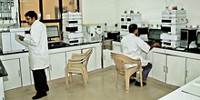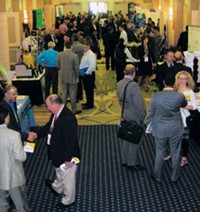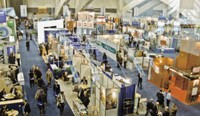Advertisement
Grab your lab coat. Let's get started
Welcome!
Welcome!
Create an account below to get 6 C&EN articles per month, receive newsletters and more - all free.
It seems this is your first time logging in online. Please enter the following information to continue.
As an ACS member you automatically get access to this site. All we need is few more details to create your reading experience.
Not you? Sign in with a different account.
Not you? Sign in with a different account.
ERROR 1
ERROR 1
ERROR 2
ERROR 2
ERROR 2
ERROR 2
ERROR 2
Password and Confirm password must match.
If you have an ACS member number, please enter it here so we can link this account to your membership. (optional)
ERROR 2
ACS values your privacy. By submitting your information, you are gaining access to C&EN and subscribing to our weekly newsletter. We use the information you provide to make your reading experience better, and we will never sell your data to third party members.
People
MIDWESTERN HOME
Several small pharmaceutical chemical makers credit the region for their success
by Michael McCoy
April 3, 2006
| A version of this story appeared in
Volume 84, Issue 14

Wisconsin and its neighboring midwestern states are miles from the pharmaceutical and biotech industry hotbeds on the East and West Coasts. They are also far from the historical cradle of the pharmaceutical chemical industry in Western Europe.
But the Midwest is something of a hidden gem in the pharmaceutical chemical world. It is home to several small but growing companies that attribute a good part of their success to their midwestern location. These companies are proof that the pharmaceutical chemical business is alive and well in the U.S., despite a spate of doomsaying to the contrary.
Last month, when Sigma-Aldrich's SAFC Pharma unit dedicated a $12 million expansion of its pharmaceutical chemical facility in Madison, Wis., the company held an organic chemistry symposium at nearby University of Wisconsin, Madison. One guest was Hector F. DeLuca, a professor in UW Madison's biochemistry department whose presence said a lot about the plant's success in an arguably unlikely place.
SAFC's Madison facility is the former Tetrionics, a company started in 1989 to build on vitamin D chemistry expertise developed in DeLuca's UW laboratories. Tetrionics' first big project was working with Chicago-based Abbott Laboratories on a synthesis for Zemplar, a vitamin D analog used to treat hyperparathyroidism.
Tetrionics left the small-company fraternity in 2004 when it was acquired by Sigma-Aldrich and integrated into the SAFC organization. But still flying the flag are companies such as Cedarburg Pharmaceuticals and Cambridge Major Laboratories of Wisconsin; Regis Technologies of Morton Grove, Ill.; and EaglePicher Pharmaceutical Services of Lenexa, Kan.
Michael W. Major, a Polish immigrant and founder, president, and chief executive officer of Cambridge Major, believes that "the Midwest will grow and become the U.S. pharmaceutical industry's Third Coast"—a reference to the region's Great Lakes. Major created Cambridge Major in 1999 by merging his own Major Laboratories with nearby Cambridge Chemical. Then in 2004 he moved the firm 5 miles to a new facility in Germantown, Wis. It now employs 58 people, including 37 chemists, 17 of whom have Ph.D.s. He says the firm has doubled its size in the past three years.
Major attributes at least some of his company's good fortune to the midwestern work ethic of its employees. "The midlevel B.S. chemist here is well-educated and a hard worker with lots of common sense," he says. In addition, a lower cost of living translates into lower salaries and a cost base that Major says is 20-30% below that on the East and West Coasts.
His bullishness also stems from the presence of educational institutions such as Northwestern University, the University of Chicago, and the state universities of Wisconsin, Iowa, and Illinois. These schools, he believes, are underrated in the worlds of chemistry and other life sciences. Yet they are a crucial source of the bachelor's and Ph.D.-level chemists needed to staff a pharmaceutical chemical company.
Major first met UW's DeLuca two years ago when they both won Ernst & Young's award for Wisconsin entrepreneur of the year in the life sciences. Major says he has been impressed by the willingness of DeLuca and other midwestern academic chemists to collaborate with industrial companies that don't offer the glamour of the drug discovery firms more common to the coasts.
James M. Cook, a chemistry professor at UW Milwaukee, says his students end up at big local companies such as Sigma-Aldrich and Abbott as well as smaller firms like Cambridge Major and Cedarburg. Chemists at these companies also continue their education at nearby schools.
While Cambridge Major was founded by a Polish immigrant, several other pharmaceutical chemical firms in the region were set up by midwesterners who wanted to stay local. Regis Technologies was started by Louis Glunz III, who is a member of an old-line Chicago family that still owns the oldest wine store in the city. Glunz earned his Ph.D. in chemistry from Notre Dame University and opened Regis in 1956. In its early years, the company was based in downtown Chicago, close to the wine shop.
One of Regis' most successful products is the Whelk-O line of silica stationary phases for chiral chromatography. Testifying to the firm's local academic ties, the line's launch in the early 1990s grew out of a collaboration with William H. Pirkle, a chemistry professor at the University of Illinois, Urbana-Champaign.
Today, Regis' fastest growing business is the custom synthesis of pharmaceutical chemicals to current Good Manufacturing Practice (cGMP) standards. Sean F. Bradley, director of business development, notes that the company recently embarked on a $3 million expansion that will add seven new non-GMP labs, a preparative supercritical fluid chromatography unit, and 10 or more scientists to its current staff of 67.
Bradley and other company executives say the Midwest's distance from the pharma/biotech concentrations on the East and West Coasts can be both a strength and a weakness when it comes to hiring and retaining skilled chemists.
For example, Regis has benefited from the downsizing that followed Pfizer's 2000 acquisition of Warner-Lambert and 2002 purchase of Pharmacia, which had earlier bought Searle. Eight of Regis' chemists previously worked at Searle's Skokie, Ill., facility, which Pfizer shuttered in 2003. Among them are Kevin Babiak, head of Regis' process R&D department, who was a 22-year Skokie veteran, and Paul Wrezel, head of analytical development, who spent nine years there.
Similarly, Charles M. Boland, executive vice president of Cedarburg Pharmaceuticals in Grafton, Wis., says most of his company's 65 employees are from the Midwest, and many of them hail from Wisconsin. "They were born and raised in Wisconsin, and they want to live in Wisconsin," he says.
Boland and James Yarger launched Cedarburg in 1997, not long after working together at Amoco Technology in Chicago. In between, Yarger had a short stint at Cambridge Chemical, and he decided to stay local when he set out on his own. Although Cedarburg is in Grafton, Yarger named it for the nearby town in which he lived and still lives.
Cedarburg's location far from the coastal hubs isn't a deterrent to hiring good chemists, Boland maintains. "We don't want to recruit from biotech companies," he says. "We want people with experience in pharmaceutical or specialty chemical companies, people with scale-up and process development experience."
When recruiting, Richard Pariza, Cedarburg's vice president of R&D, often turns to the network of university and industry contacts he developed while working for Abbott during the 1990s. "When I was at Abbott, I learned the best way to recruit chemists is to get to know their professors," Pariza says. Among the chemists he has brought to Cedarburg are students of UW Milwaukee's Cook.
For EaglePicher Pharmaceutical Services, trade shows also are key recruiting grounds. At the recent Informex custom manufacturing show in Orlando, Fla., the company posted a "We're hiring" sign at its booth. Scott B. Parker, director of business development, says the company is off to a strong start in 2006 and is looking to bolster its staff in Lenexa and in Harrisonville, Mo. It is doing particularly well in Lenexa, he adds, where it has doubled capacity to carry out pharmaceutical radiolabeling under cGMP conditions.
Although EaglePicher was soliciting résumés from industry veterans at Informex, Sandeep Nimkar, director of the Lenexa facility, says the company also recruits from the University of Kansas, Kansas State, and other midwestern colleges. Nimkar completed postdoc work at KU and says he hires out of the school's chemistry, medicinal chemistry, and pharmaceutical chemistry programs. For example, Michael Marx, manager of radiolabeled compound synthesis, earned his Ph.D. in medicinal chemistry from KU.
Midwestern executives maintain that their region offers a quality of life and cost of living that can't be matched on the coasts. EaglePicher's Parker explains that he moved to Kansas when he was a teenager, attended KU, and now lives on a farm with eight horses and 20 head of cattle. "I've got four kids," he says. "Kansas offers the right lifestyle to bring up a family, plus good schools at a good price."
Still, company executives acknowledge that the region lacks the scientific and entrepreneurial critical mass that attracts chemists to Boston or San Diego. UW Milwaukee's Cook says his international chemistry students immediately want to leave for the coasts when they graduate. Wisconsin-bred graduates, on the other hand, "grew up in Wisconsin and are willing to work at Aldrich, or Cedarburg, or Cambridge Major because they like it here and they want to stay local."
To replicate at least some of the coastal atmosphere, Major arranged a series of eight lectures at his firm last year under the theme "Chemistry That Works." Speakers included Cook; Victor Snieckus from Queen's University, Kingston, Ontario; and Bruce Lipshutz of the University of California, Santa Barbara. "I hope my employees will say, 'With this kind of excitement and activity, I don't need to go to San Diego,' " he says.
For 2006, Major is planning new lectures featuring industry speakers. He is also president this year of the Wisconsin Biotechnology & Medical Devices Association, which is working with the Wisconsin Alumni Research Foundation, UW's technology licensing arm, to teach local entrepreneurs how to start businesses based on UW technology. Such businesses perhaps will occupy the new biotech office and lab complex that is being built near Chicago out of Pfizer's former Skokie facility.
While executives like Major are bullish on the Midwest, they know certain people will never be convinced to settle there. Brian Scanlan, Major's vice president of corporate development, is a typical midwestern company employee in that he grew up in the Midwest, moved to Boston for five years, and returned home in 2002. "The bulk of the résumés we get are either from immigrants or people like me who are coming back to the Midwest," Scanlan says. "We never see a résumé from a native Californian."








Join the conversation
Contact the reporter
Submit a Letter to the Editor for publication
Engage with us on Twitter